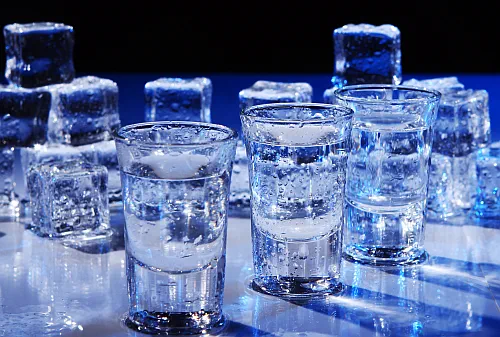Vodka: The Quintessential Spirit of Versatility
Vodka, often perceived as colorless and flavorless, is a spirit defined more by its distillation process than its ingredients. This unique characteristic allows Vodka to be made from various fermentable materials, including grains, potatoes, sugar beets, and even fruits. To qualify as Vodka, it must be distilled to a minimum of 190 proof (95% alcohol by volume), ensuring its purity and high alcohol content.
The Subtle Art of Vodka
Originating from the Slavic word “voda,” meaning water, Vodka’s exact birthplace—whether Russia or Poland—remains a topic of debate. Today, it’s a global spirit crafted in nearly every country. Despite its reputation for being flavorless, connoisseurs know that vodkas subtly differ in flavor notes, fragrance, and even sweetness.
Vodka’s neutral profile, once seen as uninteresting in the bartending world, has now been embraced for its versatility. It’s a canvas for creativity, amplifying the flavors of other cocktail ingredients without overpowering them. As bartender John Clement puts it, the possibilities with Vodka in mixed drinks are virtually limitless. Its ability to blend seamlessly into any concoction makes it a staple in any mixologist’s repertoire.
Innovations in Vodka: Infusions and Flavors
Vodka’s neutrality also makes it an ideal candidate for infusions. By infusing Vodka with spices, herbs, fruits, or vegetables, one can create a unique spirit tailored to specific cocktail profiles. The process is simple yet allows for endless experimentation, with the infused Vodka lasting up to a month.
Moreover, the market has flavored vodkas, ranging from citrus and vanilla to more adventurous varieties like whipped cream and chocolate. These flavored vodkas, sometimes slightly sweetened, offer additional dimensions for cocktail crafting.
11 Must-Try Vodka Brands

For those looking to explore the world of Vodka, here are 11 essential brands that cater to a variety of tastes and preferences:
- Tito’s Handmade Vodka: A corn-based vodka known for its smoothness and versatility.
- Grey Goose: A premium French vodka celebrated for its clear, crisp taste.
- Sobieski: A Polish vodka that offers exceptional quality at an affordable price.
- Aylesbury Duck: A Canadian vodka known for its clean and neutral profile.
- Luksusowa: A potato-based Polish vodka with a rich and smooth texture.
- Ketel One: A Dutch vodka renowned for its sophisticated and crisp character.
- Russian Standard Vodka: A classic Russian vodka embodying traditional vodka-making techniques.
- Stolichnaya: Another iconic Russian brand offering a perfect balance of smoothness and flavor.
- Reyka: An Icelandic vodka known for its purity and a slight hint of sweetness.
- Absolut Elyx: A luxury vodka from Sweden crafted in copper stills for a silky texture.
- ZU Zubrowka Bison Grass Vodka: A unique Polish vodka infused with bison grass, giving it a distinct herbal flavor.
The Most Known Cocktails, Including Vodka
Dirty Blonde, Mirto Martini, Cosmopolitan, Blueberry Cosmopolitan, Vodka Gimlet, Skyliner, Moscow Mule, Lemon Drop, Suburban Anxiety, Kamikaze, Celery Kamikaze, Bloody Mary, Morning Glory, Sparkling Yuzu Gimlet, Boozy Watermelon Slushy, Coco Cooler, Wasabi Grasshopper, White Russian, and Matcha Milk Punch.
Did you know about the Vodka?
- Vodka’s Origins Are Disputed: While commonly associated with Russia and Poland, the exact origins of Vodka are a subject of historical debate. Both countries claim to have invented this spirit.
- Derived from ‘Water’: The word ‘vodka’ is a diminutive form of the Slavic word ‘voda’, which means water, reflecting its clear appearance and perhaps its essential role in Slavic life.
- Not Always Flavorless: Contrary to popular belief, not all Vodka is flavorless and odorless. Traditional Eastern European vodkas subtly retain the flavor of their base ingredients, be it grain, potato, or even grapes.
- Agricultural Flexibility: Vodka can be distilled from virtually any fermentable ingredient with starch or sugar. This includes potatoes, grains, and more unusual sources like grapes, beets, and even milk.
- Medicinal Uses: Historically, Vodka was used as a medicine, believed to cure ailments ranging from infertility to the plague. It was also a common antiseptic and disinfectant.
- The Purest Spirit: Vodka is distilled to a high alcohol content and then diluted. Along with charcoal filtering, this process makes it one of the purest spirits in terms of lack of congeners, substances produced during fermentation.
- A Cold War Symbol: Vodka symbolized Russian culture and political power during the Cold War. It was used in diplomatic events and became a staple in American bars to signify the era’s cultural exchange.
- Space-Age Spirit: Vodka has even traveled to space. In 1997, a Russian space shuttle carried a brand of Vodka to the Mir space station, marking one of the first instances of alcohol in space.
- World Record Prices: The world’s most expensive bottle of Vodka, valued at $1.3 million, was stolen from a bar in Denmark in 2018. The bottle was made of gold and silver and had a diamond-encrusted cap.
- Global Popularity: Vodka is one of the world’s most popular spirits. It’s a staple in many countries and is the base for some of the most famous cocktails, including the Bloody Mary, the Moscow Mule, and the Martini.
Vodka is much more than a simple, clear spirit. Its understated character is its greatest strength, providing a foundation for many cocktails and flavor experiments.
In conclusion, Vodka, a type of distillate, is typically made from fermented grains or potatoes, although some may use fruits or molasses instead. The base material can undergo multiple distillations to create stronger and more refined varieties. Its origin is disputed between Russia and Poland. While written records suggest its consumption since the 15th century, some believe it was present even earlier but under a different name. Today, Vodka is produced globally, with popular brands including Smirnoff, Stolichnaya, Russian Standard, Finlandia, Grey Goose, and Absolut. The taste of Vodka is largely influenced by its base ingredient and generally has a potent flavor with a lasting aftertaste. It is often found in classic cocktails such as Vodka martini, Vodka tonic, White Russian, and Cosmopolitan but can also be enjoyed on its own – chilled to perfection.
Whether you’re a seasoned mixologist or a casual enthusiast, Vodka offers a world of possibilities to explore and savor.

